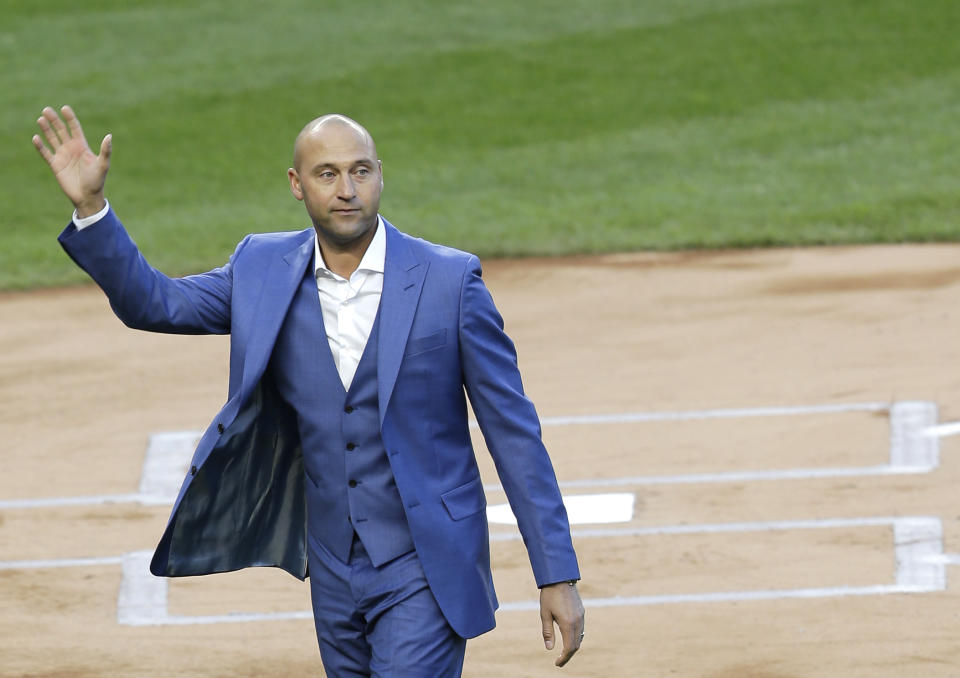Jeter group buys the Marlins—here's why the $1.2 billion price tag makes sense

Derek Jeter will finally get what he has publicly sought for months: the retired Yankee will become a part owner of the Miami Marlins, as first reported by the Miami Herald on Friday afternoon and confirmed by Fox and USA Today.
Miami Marlins president David Samson submitted the signed agreement to Major League Baseball on Saturday, the AP reported.
The club has been on the sale block all year, with a wide range of rumored buyers attached (including Jared Kushner’s family), but Jeter and his interest was a constant. Back in April, Marlins owner Jeffrey Loria agreed in theory to sell the team to a group led by Jeter and Jeb Bush; then came reports that they didn’t have the full financing secured yet; then they failed to get it. Bush dropped out.
Now the Marlins will sell to a group led by Bruce Sherman, a Manhattan venture capitalist and cofounder of the Naples-based Private Capital Management. The group includes 16 different investors, and among them is Michael Jordan.
But it’s Jeter who will be the clear face of the group, much like NBA legend Magic Johnson when he bought the Los Angeles Dodgers with Guggenheim Partners in 2012.
Jeter, according to reports, is contributing $25 million of his own money—just 2.08% of the price tag. But he will run baseball operations.
He has the star power, the connections, and the baseball cred; he just needed the money. And becoming an MLB part owner is just the latest step in a post-baseball career that has become the model for retired pro athletes.
Is $1.2 billion for the Marlins crazy?
Now, how about that price tag?
$1.2 billion for a franchise that lost money last year, has not made the playoffs in 14 years, and does not play in a top-10 sports media market?
Sure.
The price should come as no surprise, since American pro sports teams have been one of the few investments almost guaranteed to grow in value—and grow in value quickly.
The most recent 15 American pro sports teams to sell (in the ‘big three’ leagues: NFL, NBA, MLB) have all sold for prices that shattered their most recent Forbes valuation (widely cited as the de facto best estimate of sports franchise values) at the time of sale. That’s a sign that the market has deemed almost any pro franchise extremely valuable, regardless of the geographic location and the team’s recent win record.
Here are the five most recent pro sports teams (NFL, NBA, or MLB) to change hands, with the valuation and the sale price bolded for emphasis. You’ll notice that every one of them sold for a premium over their Forbes valuation: Seattle Mariners, Aug. 2016, valued at $1.2 billion, sold 90% for $1.26 billion, valuing the team at $1.4 billion; Brooklyn Nets, Dec. 2015, valued at $1.6 billion, sold for $1.7 billion; Atlanta Hawks, June 2015, valued at $825 million, sold for $850 million; Buffalo Bills, Sept. 2014, valued at $935 million, sold for $1.1 billion; LA Clippers, June 2014, valued at $575 million, sold for $2 billion.
In many of these cases, you might say that the buyers overpaid. But buyers are happy to overpay—they’re sure of the future return.
In its MLB valuations in April, Forbes pegged the Marlins at $940 million, ranking them 25th out of MLB’s 30 teams. And yet, Loria—an owner who drove the team into the ground—managed to fetch over $1 billion, valuation be damned.
Major League Baseball officials will get the sale contract papers on Friday night, the Herald reports, and the sale is expected to close in October.
—
Daniel Roberts is the sports business writer at Yahoo Finance. Follow him on Twitter at @readDanwrite.
Read more:
Derek Jeter shows the new playbook for athlete investing
Why the Chargers move to LA makes financial sense
How the Raiders will boost the local Las Vegas economy
How the Las Vegas Raiders could be the NFL’s gambling tipping point
Inside Sheldon Adelson’s plan to build an NFL stadium in Las Vegas

 Yahoo Finance
Yahoo Finance 
